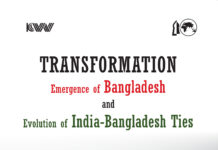Shahab Enam Khan
Does total oblivion await the BNP? This is the concluding part of yesterday’s long form
While the BNP is surviving through some populist TV talk shows, which the government is sportively allowing in order to project its pledge for freedom of speech, and through loud speakers in the mosques — the ship is sinking, and no amount of unsinkable loyalty to the greater idea of democracy and religious harmony can change that. The question is whether the loyalists are consciously willing to sink with it.
The BNP’s insipid spokespersons on television or public debates may talk of introspection, security paranoia, and political auditing, but it sounds like nothing more than “whining and groaning.”
Despite its media presence, meagre though, the BNP no longer determines what the news agenda is nor has it been able to erase off its terrorism-extremism tattoo.
However, ceteris paribus, many will surely decide to abandon ship (as many have already in various cuts) and form alternative platforms. In fact, dignity and self-esteem leave them with nothing much to do.
Some of the senior leaders of the party may stick to the party, but they cannot change course until Tarique Rahman wishes to see a meaningful change.
Mr Rahman is who he has always been, and who he will always be. As the classic rules of politics would indicate, the more unpopular the government becomes the more Mr Rahman would rise as Mr Right.
But that too will not happen until he is back home and his so-called loyal clubbers and media trumpets are effectively replaced by leaders and workers suffering at the grassroots level. It is tough to think of precedents for this to happen.
What further disturbs the ordinary Bangladeshis is the political eccentricity of the BNP. It has been taken over by ducked intellectuals. Ducks undersell the party spirit, actually. A fringe party can accommodate eccentricity but the BNP is supposed to be a serious party of the kind that could plausibly form a government in the distant future.
It is by no means obvious that the BNP has no respect in the society, perhaps its acceptance has increased due to the AL’s indubitable failures in delivering credible elections and public safety. However, all boils down to the BNP’s leadership.
Given the growing anti-establishment sentiment among the aam janata (common people), it won’t be surprising to see even a banyan tree to win a free and fair election in Bangladesh.
But the question is — who would happily deliver a free and fair election? Neither the Chief Election Commissioner Mr Kazi Rakibuddin Ahmad’s office, nor the politics that AL-BNP practice would deliver it.
Hence, the critical mass of the populace will increasingly be looking forward to alternatives (but that surely won’t include Jamaat that acquired less than 5% vote in 2008 elections).
The recent visit of S Jaishankar, the Indian Foreign Secretary, along with the renewed rise of extremist fear and minority crush, will bring more terrible news for the BNP, as it has brought some to the AL too.
For the Indians and the Westerners, the ineffectiveness of the AL in taming extremism (both political and social) and the eclipse of the BNP as a compelling political entity would require readjusting to new socio-political realities in Dhaka.
Over the years, Delhi and Washington often found themselves at odds with the BNP-led governments, albeit more so since 2005. At the same time, Delhi and Washington feel a subtle comfort level with the pro-Delhi AL than with homespun religious-nationalist BNP.
It is evident that the foreigners won’t help the BNP come to power. In fact, the alleged BNP-Mossad tie has brought further hefty peril than promise for the party.
The sooner they realise, the better it would be for them to manage their own politics.
Otherwise, I will keep hearing more debate to the issue of BNP-Jamaat-mukto Bangladesh. The question this time will not be if this is going to happen, but when.
With that fear in my mind, I often ask my BNP friends (and AL friends too), loyalty is good, but what would you do when there won’t be anything left to be loyal to? Things won’t get better anytime soon. There is no symptom that the AL regime will allow a better political space for democracy to thrive.
But that should not be an excuse to act like a heretic party which is, whether one likes it or not, the largest shadow opposition party.
For now, the BNP faces the biggest challenge in its 38-year history. Will the Zia dynasty ride out this whirlwind, as it has in the past? Or will the AL achieve its often loudly-stated objective of a “BNP-Jamaat-free Bangladesh”? The BNP needs to address these questions with sensibility and maturity.
Source: Dhaka Tribune










